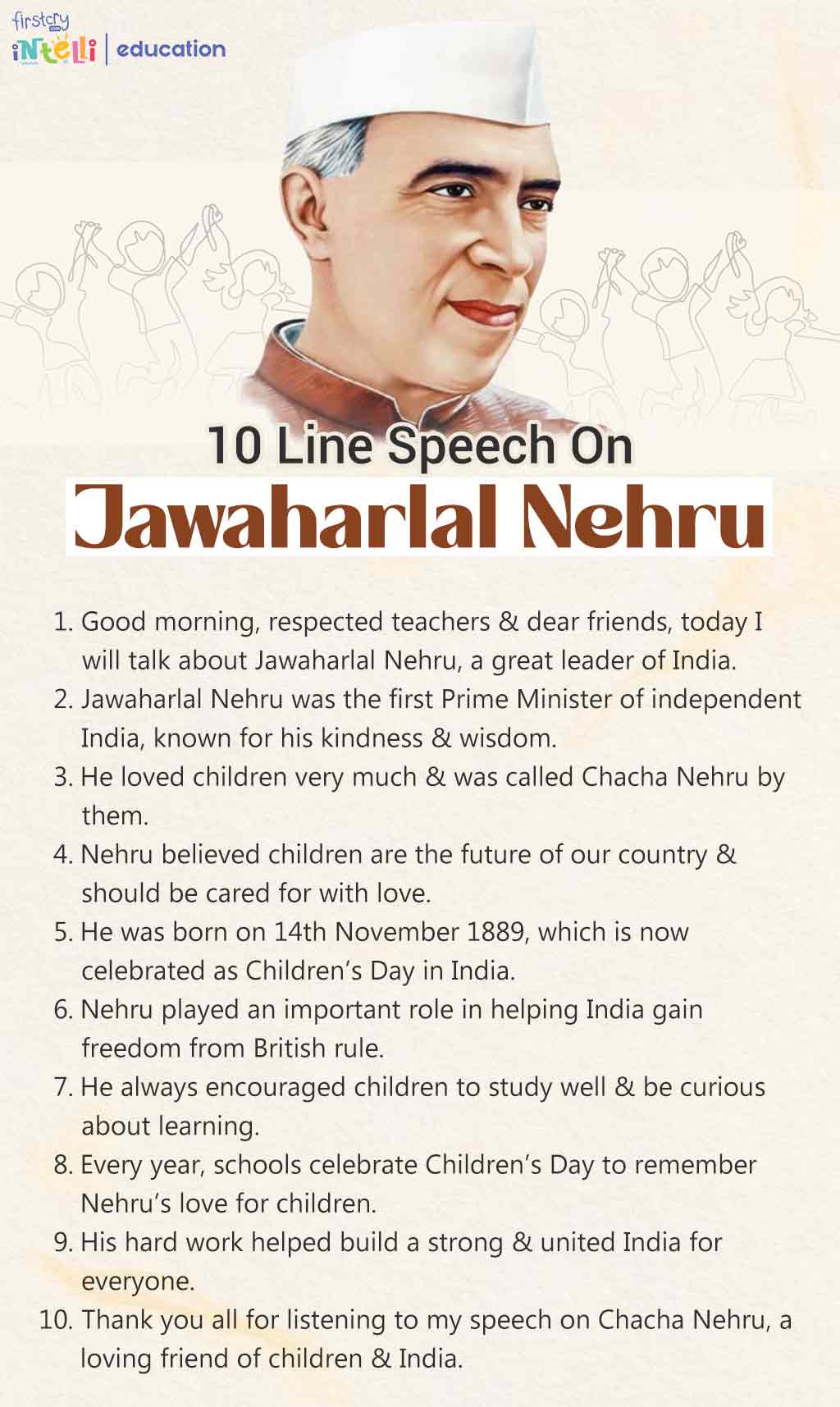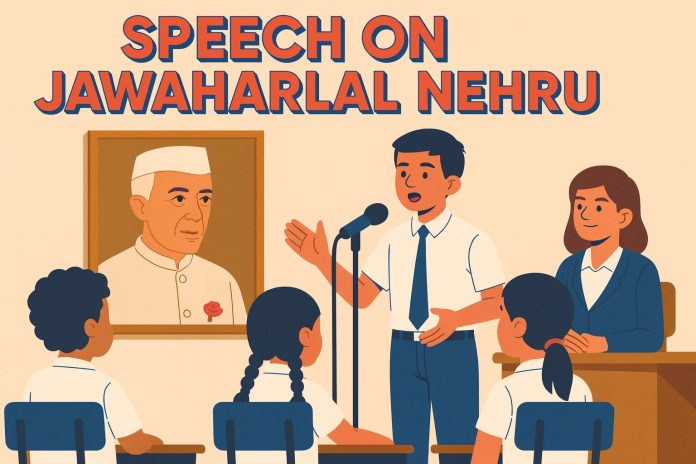Last Updated on November 5, 2025
Jawaharlal Nehru was a great leader and the first Prime Minister of independent India. He played a very important role in shaping the country’s future. Known fondly as Chacha Nehru, he loved children and believed that they were the bright future of the nation. Every year, his birth anniversary is celebrated as Children’s Day to honour his affection for kids and his vision for their education and well-being.
Thank you for reading this post, don't forget to subscribe!
These speeches on Jawaharlal Nehru for children and students explain his contribution to India’s independence, his love for children, and his vision of building a strong, educated nation. The speech on Jawaharlal Nehru in English uses simple words and clear sentences, making it easy for students of all ages to understand and deliver confidently. It highlights why Nehru remains an inspiring figure and why learning about him is essential for young minds today.
10 Line Speech On Jawaharlal Nehru In English
Here is a simple and sweet speech on Chacha Nehru, perfect for preschoolers to understand and enjoy. This 10-line on Jawaharlal Nehru in English highlights his love for children and his role as India’s first Prime Minister.
- Good morning, respected teachers and dear friends, today I will talk about Jawaharlal Nehru, a great leader of India.
- Jawaharlal Nehru was the first Prime Minister of independent India, known for his kindness and wisdom.
- He loved children very much and was called Chacha Nehru by them.
- Nehru believed children are the future of our country and should be cared for with love.
- He was born on 14th November 1889, which is now celebrated as Children’s Day in India.
- Nehru played an important role in helping India gain freedom from British rule.
- He always encouraged children to study well and be curious about learning.
- Every year, schools celebrate Children’s Day to remember Nehru’s love for children.
- His hard work helped build a strong and united India for everyone.
- Thank you all for listening to my speech on Chacha Nehru, a loving friend of children and India.

1 Minute Speech On Jawaharlal Nehru
Here is a short and simple speech about Jawaharlal Nehru, perfect for quick presentations. This speech about Jawaharlal Nehru highlights his role as a leader and his love for children.
Good morning, respected teachers and my dear friends,
Today, I am going to talk about Jawaharlal Nehru, one of the greatest leaders of India. He was the first Prime Minister of our country and played a significant role in India’s freedom struggle. Nehru Ji loved children very much, so much that children called him Chacha Nehru. He believed that children are the future of India and should be given a good education and love.
Every year, we celebrate Children’s Day on his birthday, 14th November, to remember his love for kids and his dreams for their bright future. Nehru Ji worked hard to make India a strong and independent nation where every child can have an equal chance to grow and learn. His kindness and vision continue to inspire us all.
Thank you for listening to my speech about Jawaharlal Nehru.
2 Minute Speech On Jawaharlal Nehru
This Jawaharlal Nehru speech in English for students highlights his leadership and vision for a free India. It is written to help young learners understand his contributions and love for children.
Good morning, respected teachers and dear friends,
Today, I will talk about Pandit Jawaharlal Nehru, an important leader who helped shape India’s future. He was the first Prime Minister of India and loved children very much. Born on 14th November 1889, this day is now celebrated as Children’s Day in India to honour his care for kids.
Nehru believed that children are the future of our country and should be given love and a good education. He worked hard to make sure every child could learn and grow well. His vision was to build a better India through knowledge, unity, and kindness.
During India’s fight for freedom, Jawaharlal Nehru was a brave leader who inspired many people with his words and actions. After India became free, he helped make it a modern country by encouraging science and education for everyone. His work still helps our nation today.
We remember him as a leader who always believed in the power of children and education. His life teaches us to dream big and work hard for a bright future.
Thank you for listening.
Short Speech On Jawaharlal Nehru
Here is a short, simple speech on Jawaharlal Nehru that highlights his key contributions and his love for children. This speech is perfect for quick presentations and is easy to understand.
Good morning, respected teachers and dear friends,
Today, I am going to talk about Pandit Jawaharlal Nehru, an important leader in India’s history and the country’s first Prime Minister. Nehru Ji played a vital role in India’s struggle for freedom from British rule. He was a great thinker, a wise leader, and a kind-hearted person who loved children very much. Because of his affection for children, they lovingly called him Chacha Nehru.
Nehru Ji was born on 14th November 1889, and this day is celebrated every year as Children’s Day in India to honour his love and care for children. He believed that children are the future of the nation and that they should be given all the opportunities to learn and grow. Nehru Ji wanted every child to receive a good education so they could help build a strong, developed India.
As the first Prime Minister, Nehru worked hard to unite the country and lay the foundation for its progress. He focused on science, technology, and education to help India become a modern and independent nation. Nehru Ji’s leadership and vision continue to inspire people today.
In schools across India, his birthday is celebrated with fun activities and programmes for children. This is to remind us all how important it is to care for our young generation. Nehru Ji’s belief in children’s dreams and rights makes him a beloved and respected leader.
Thank you for listening to my speech about Pandit Jawaharlal Nehru, a great leader and friend of children.
Long Speech On Jawaharlal Nehru
This Jawaharlal Nehru speech in English for students explores his early life and education, involvement in freedom movements, and the events surrounding his death. It provides a thorough understanding of his remarkable journey and legacy.
Good morning, respected teachers and dear friends,
Today, I am honoured to speak about Pandit Jawaharlal Nehru, a visionary leader whose life and legacy continue to inspire millions. In this speech, I will cover three important aspects of his journey: his early life and education, his involvement in India’s freedom movements, and the circumstances surrounding his passing.
Early Life And Education
Jawaharlal Nehru was born on 14th November 1889 in Allahabad, British India, into a prominent Kashmiri Brahmin family. His father, Motilal Nehru, was a distinguished lawyer and leader, and his mother, Swarup Rani, belonged to a respected family settled in Lahore. Nehru’s privileged upbringing allowed him to receive his initial education at home from private tutors and governesses, including Ferdinand Brooks, whose interest in theosophy sparked Nehru’s curiosity about India’s religious and cultural heritage. At the age of fifteen, Nehru moved to England and attended Harrow, one of the country’s leading boarding schools. He then studied at Trinity College, Cambridge, earning an honours degree in Natural Sciences in 1910. His time in England was formative, exposing him to Western ideas and philosophies. Later, Nehru pursued law at the Inner Temple in London, qualifying as a barrister in 1912. This broad education shaped his modern worldview and prepared him for future leadership.
Involvement In Freedom Movements
Upon returning to India, Nehru started practising law but soon became involved in the country’s struggle for independence. Inspired by Mahatma Gandhi’s ideals and nonviolent approach, Nehru joined the Indian National Congress and quickly emerged as a prominent figure in the movement. He was passionate about achieving “Purna Swaraj” or complete independence for India, and advocated fearlessly for the cause. Nehru was arrested several times for participating in protests, civil disobedience, and demonstrations against British rule. His leadership and unwavering commitment, alongside those of others such as Gandhi and Sardar Patel, were instrumental in achieving India’s freedom. In 1947, with independence finally realised, Nehru was sworn in as the country’s first Prime Minister. He worked tirelessly to unite a diverse nation, guiding the government towards progress in science, education, and infrastructure. He focused on democracy, secularism, and the upliftment of all citizens, especially children and the socially disadvantaged.
Death Of Jawaharlal Nehru
Jawaharlal Nehru’s remarkable journey came to an end on 27th May 1964, after a period of declining health. News of his death saddened the nation, as Nehru had been India’s guiding force for seventeen years as Prime Minister. Tributes poured in from across the world, honouring his leadership, compassion, and ideals. Nehru left a lasting legacy of democratic values, secularism, and a vision for a modern India rooted in unity and progress. Even after his passing, his ideas and contributions continue to shape the country’s direction and the lives of young people.
Jawaharlal Nehru’s life teaches us about courage, compassion, and the importance of education and unity. His early experiences, tireless work for freedom, and dedication to India have left an everlasting impact. As children and students, we must learn from his values, dream big, and strive to build a better nation.
Thank you for listening.
FAQs
1. How Do I Start An Essay On Jawaharlal Nehru?
Begin your essay with a brief introduction about Jawaharlal Nehru, mentioning his role as India’s first Prime Minister and his importance in the country’s freedom struggle.
2. What Main Points Should I Include In The Essay?
Focus on Nehru’s early life and education, his involvement in the Indian freedom movement, key achievements as Prime Minister, and his legacy, including Children’s Day.
3. How Should I Organise My Essay On Jawaharlal Nehru?
Divide the essay into clear sections, with headings such as Early Life, Freedom Movement, Prime Ministership, and Death & Legacy, to improve flow and clarity.
4. Can I Include Personal Reflections In The Essay?
Yes, sharing what you have learned from Nehru’s life or how he inspires you can make your essay more engaging and personal.
Writing a speech on Jawaharlal Nehru helps students understand the life and contributions of a great leader who loved and believed in the future of children. These speeches for classes 1, 2, and 3 offer a simple way to express his importance and inspire young minds to follow his vision for a better India.
Also Read:
Essay on Children’s Day
Essay On Sardar Vallabhbhai Patel
Speech on Sardar Vallabhbhai Patel
Speech on Dr. Sarvepalli Radhakrishnan











